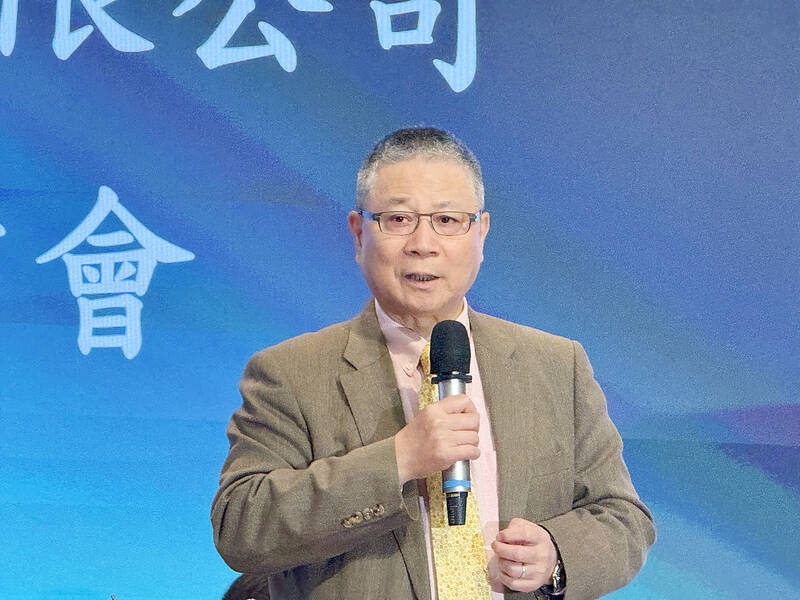Wistron Corp (緯創), a contract manufacturer of servers and notebook computers, yesterday said that its new US plant would begin producing high-performance computing (HPC) devices for customers by the end of next year, as part of efforts to mitigate the impact of US tariffs.
The company has secured its first order for its plant in Dallas, Texas, and is in discussions with other potential customers, Wistron president Jeff Lin (林建勳) told reporters following the annual shareholders’ meeting in Taipei.
Wistron has been operating a plant in Dallas for about a decade, and the new capacity expansion is a continuation of its long-term strategy, not a sudden move, Lin said.

Photo: CNA
The new production line in Dallas would focus on HPC products and feature a high degree of automation, Lin said, adding that the company plans to operate a maintenance service facility at the site.
Asked whether Wistron plans to build new factories in the Middle East, company chairman Simon Lin (林憲銘) said there are no such plans. Instead, Wistron would assist clients with shipping products to the region.
Regarding artificial intelligence (AI) server demand, Simon Lin said Wistron anticipates continued growth, driven by increasing corporate adoption, despite geopolitical tensions and uncertainties surrounding US tariff policies.
Asked whether US President Donald Trump’s tariff policy would affect its AI server orders, Jeff Lin said Wistron is still unable to fully meet customers’ demand, as customers are still increasing computing power to meet the rising demand for AI applications.
“I believe the demand is still there despite the impact of tariffs,” he said.
However, the company is cautious about the potential impact of US tariffs on notebook computers.
The retail prices of notebook computers could go up by 10 percent to 20 percent in the worst-case scenario, he added.
Wistron is seriously considering shifting some notebook computer manufacturing to Mexico, eyeing the preferential tariffs under the US-Mexico-Canada Agreement, Jeff Lin said.
However, no final decision has been made, as production costs in Mexico remain higher than in Asia, he added.
Wistron expects to ship more notebook computers this year compared with last year, attributable to replacement demand due to the end of Microsoft Corp’s Windows 10 operating system and the post-COVID-19 upgrade cycle, he said.
In the first quarter, Wistron shipped 4.9 million notebooks, a 7.55 percent decline from the previous quarter, but a 6.52 percent increase year-on-year, the company said.

KEEPING UP: The acquisition of a cleanroom in Taiwan would enable Micron to increase production in a market where demand continues to outpace supply, a Micron official said Micron Technology Inc has signed a letter of intent to buy a fabrication site in Taiwan from Powerchip Semiconductor Manufacturing Corp (力積電) for US$1.8 billion to expand its production of memory chips. Micron would take control of the P5 site in Miaoli County’s Tongluo Township (銅鑼) and plans to ramp up DRAM production in phases after the transaction closes in the second quarter, the company said in a statement on Saturday. The acquisition includes an existing 12 inch fab cleanroom of 27,871m2 and would further position Micron to address growing global demand for memory solutions, the company said. Micron expects the transaction to

Nvidia Corp’s GB300 platform is expected to account for 70 to 80 percent of global artificial intelligence (AI) server rack shipments this year, while adoption of its next-generation Vera Rubin 200 platform is to gradually gain momentum after the third quarter of the year, TrendForce Corp (集邦科技) said. Servers based on Nvidia’s GB300 chips entered mass production last quarter and they are expected to become the mainstay models for Taiwanese server manufacturers this year, Trendforce analyst Frank Kung (龔明德) said in an interview. This year is expected to be a breakout year for AI servers based on a variety of chips, as

Global semiconductor stocks advanced yesterday, as comments by Nvidia Corp chief executive officer Jensen Huang (黃仁勳) at Davos, Switzerland, helped reinforce investor enthusiasm for artificial intelligence (AI). Samsung Electronics Co gained as much as 5 percent to an all-time high, helping drive South Korea’s benchmark KOSPI above 5,000 for the first time. That came after the Philadelphia Semiconductor Index rose more than 3 percent to a fresh record on Wednesday, with a boost from Nvidia. The gains came amid broad risk-on trade after US President Donald Trump withdrew his threat of tariffs on some European nations over backing for Greenland. Huang further

HSBC Bank Taiwan Ltd (匯豐台灣商銀) and the Taiwan High Prosecutors Office recently signed a memorandum of understanding (MOU) to enhance cooperation on the suspicious transaction analysis mechanism. This landmark agreement makes HSBC the first foreign bank in Taiwan to establish such a partnership with the High Prosecutors Office, underscoring its commitment to active anti-fraud initiatives, financial inclusion, and the “Treating Customers Fairly” principle. Through this deep public-private collaboration, both parties aim to co-create a secure financial ecosystem via early warning detection and precise fraud prevention technologies. At the signing ceremony, HSBC Taiwan CEO and head of banking Adam Chen (陳志堅)